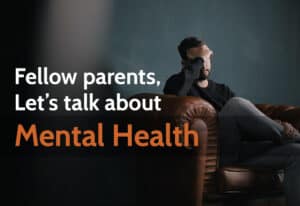(Listen to this content instead on our podcast — Just Needs Podcast Episode 18 covers Mental Health for Parents)
We are all hearing a lot about mental health. But, what is it really?
“Mental health includes our emotional, psychological, and social well-being. It affects how we think, feel, and act. It also helps determine how we handle stress, relate to others, and make choices. Mental health is important at every stage of life, from childhood and adolescence through adulthood.” *
Mental health is a part of all of our lives. Positive mental health allows people to:
- Cope with the stresses of life, including parenting
- Work productively
- Make meaningful contributions to their communities
- Realize their full potential
We know we can do things to take care of ourselves emotionally, psychologically or socially. We aren’t always sure how, but we know we should. Sometimes changes we make are enough. Sometimes they’re not. Sometimes we need more.
Mental health is considered when:
- The doctor takes extra time with her patient to really listen about how it’s going at home for a single parent.
- The teacher decides to call the parent instead of write a note or send an email because she’s noticed some things about her students’ behavior.
- The person on the other end of the phone responds with empathy and is present when a friend seems particularly distant.
- The barber lays on the floor to cut a child’s hair because that is where the child is calm.
Mental health is not a separate part of our lives, it is woven throughout our lives.
It is impacted by our biology, our life experiences or our family history. Mental health problems are common and help is available. As parents, sometimes we fall into a trap of thinking that a constant state of stress, isolation, or exhaustion is normal. I remember the first time I retold a story about how I would spend hours on my kitchen floor after the kids went to bed because I was too paralyzed to get up to clean the kitchen but needed a break from housework and caring for young children. It seemed very normal to me. Until I saw the reaction of the person I was telling.
We take care of our physical bodies with exercise and nutrition and doctor visits. We get medicine when we need it for an infection or an injury. Let’s be sure we take care of our mental health, too. And in times of stress, no matter the root, talk to your doctor or call a counselor, seek more support and know that you’re not weak for doing so, you’re strong for recognizing that you need it… not only for you, but for your family.
Caring for a child with a disability can be a fulfilling experience. It can also be challenging and stressful. Caregivers and parents sometimes forget to take care of themselves as much as they do their children.
Check out these resources for supporting both yourself and your child:
- Mental health and children with disabilities: A webinar
- Support for parents of a child with mental illness: 3 ways to be a great friend
- Self-care for parents of medically complex children: Tips from a seasoned mom
*Source: mentalhealth.gov:




